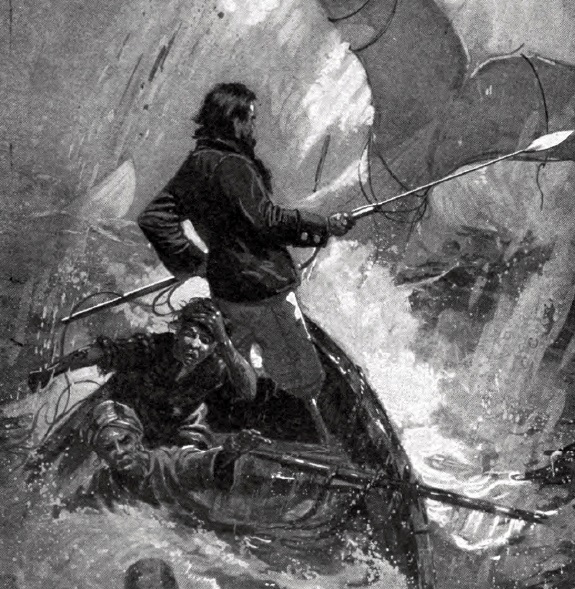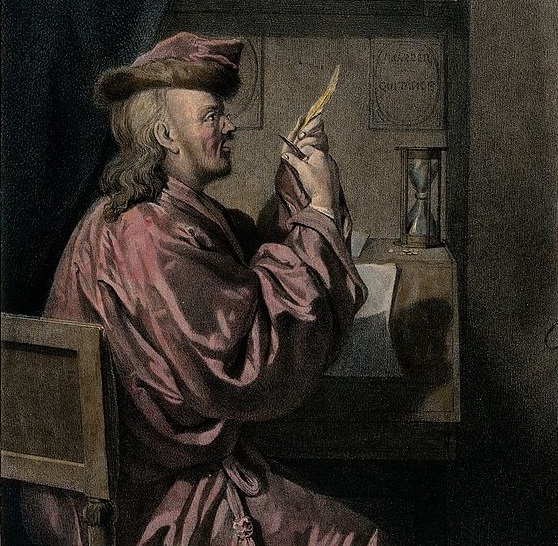
by Richard Subber | Mar 29, 2025 | Book reviews, Books, Books Commentary, Joys of reading, Language, Poetry
Moby-Dick and stuff….
I know whale tales aren’t for everyone.
If you’re still with me, you might be interested to know that Herman Melville’s iconic whale story was published 174 years ago (titled: “The Whale”) in London, and then, a month later, in New York.
The original American title is Moby-Dick; or, The Whale. Melville actually went to sea as a crewman on a whaling vessel, and based his novel in part on a real sperm whale named Mocha Dick, known to South Pacific sailors in the 1840s.
Early in his career Melville was briefly acclaimed for some of his South Pacific stories, such as Typee, but he was obscure during the last 30 years of his life. He earned only $1,200 or so from the sale of about 3,200 copies of Moby-Dick, which was out of print when he died in 1891.
A first American edition of the book can easily be secured if you have about $80,000 (free shipping!) to spend.
Melville wrote in a variety of genres—again, not for all tastes. I’m a big fan of Moby-Dick, and I’m also an advocate for Bartleby, the Scrivener: A Story of Wall Street. Nothing of the South Pacific here. The circumstances of this desiccated short story are curious, even eccentric, incredulous. The withered and aloof Bartleby is presented, examined and disdained, until his very dispirited isolation makes him the object of the narrator’s genuine but increasingly troubled caretaking.
Don’t overlook Billy Budd, Sailor. It’s a searing morality play.
You may be surprised to know that Melville also wrote poetry. One critic has somewhat ponderously suggested that Moby-Dick is filled with Melville’s incipient poetry. I certainly believe that a story can contain a poem, but I don’t see anything like that in Moby-Dick.
* * * * * *
Book review. Copyright © Richard Carl Subber 2025 All rights reserved.
The “dime novels” in the Civil War
Think “blood-and-thunder”…
–
In other words: Poems for your eyes and ears with 64 free verse and haiku poems,
and the rest of my poetry books are for sale on Amazon (paperback and Kindle)
and free in Kindle Unlimited, search Amazon for “Richard Carl Subber”
* * * * * *

by Richard Subber | Feb 20, 2025 | Book reviews, Books, Joys of reading, Reflections, Tidbits
a literate TO DO list
Book review:
Tabula Rasa: Volume 1
by John McPhee (b1931)
New York: Picador, 2023
180 pages
It’s potentially thrilling when a talented author decides to clear his plate and clear his mind of the old ideas that haven’t been transformed to words.
I dare to suggest that McPhee’s title, Tabula Rasa, was chosen with tongue firmly pressed against cheek. His mind was working and his imagination was full when he picked the best words for his TO DO list.
Some of the appeal of Tabula Rasa is that his short pieces (50 of them) were collected but not organized. Each one is at least around the corner from the next one, and it’s easy to guess that McPhee never was bored while he wrote them.
This is a literate and thought-filled way to clear the deck.
* * * * * *
Book review. Copyright © Richard Carl Subber 2025 All rights reserved.
Boz indeed! Sketches by Boz
Charles Dickens delivers,
in a fastidiously literary kind of way…
–
In other words: Poems for your eyes and ears with 64 free verse and haiku poems,
and the rest of my poetry books are for sale on Amazon (paperback and Kindle)
and free in Kindle Unlimited, search Amazon for “Richard Carl Subber”
* * * * * *

by Richard Subber | Jan 12, 2025 | Book reviews, Books, Joys of reading, Poetry, Reviews of other poets
writing ingenuous truth…
Book review:
Natural Life with No Parole
by Sarah Rossiter
Georgetown, KY: Finishing Line Press, 2016
Rossiter’s poetry is worth a second read.
I think her word choices and line breaks are a bit disorganized, but nevertheless coherent.
Natural Life with No Parole is about what she sees and hears and feels, with genuine verve and ingenuous truth about the reality of human emotions.
She finds it natural to say things like “…That’s all there was, it wasn’t much, but joy is like that.”
Let the flavor of that line wrap around your tongue.
Quoted line is from “Woman in a White Truck, Driving”
* * * * * *
Book review. Copyright © Richard Carl Subber 2025 All rights reserved.
Book review: The Snow Goose
…sensual drama, eminently poetic…
by Paul Gallico
–
In other words: Poems for your eyes and ears with 64 free verse and haiku poems,
and the rest of my poetry books are for sale on Amazon (paperback and Kindle)
and free in Kindle Unlimited, search Amazon for “Richard Carl Subber”
* * * * * *

by Richard Subber | Dec 26, 2024 | Book reviews, Books, Books Commentary, Joys of reading
Book reviewing never has been
the noblest profession.
The art of the book review is relatively young. Edgar Allan Poe wrote some reviews for Graham’s Magazine in the 1840s. The first explicitly titled book review appeared in 1861—it was a sweetheart review, in the awkwardly reserved language of the era:
“The present work has the additional recommendation of an unmistakably useful subject…”
An interesting point is that no one thought there was a need for book reviews before the middle of the 19th century. The Junto: A Group Blog on Early American History says:
“By the 1840s, improved production techniques and faster distribution networks meant that middle-class readers in America could expect convenient access to a wide range of literary materials in a variety of formats. But they also meant that readers trained to prize discernment needed more sophisticated ways to evaluate the materials passing before their eyes. This was one of the requirements that led to early attempts to define an American national literary canon.”
Book reviewers haven’t been getting a lot of respect since the early days. Poe criticized book reviews in 1846:
“We place on paper without hesitation a tissue of flatteries, to which in society we could not give utterance, for our lives, without either blushing or laughing outright.”
A century later, George Orwell had these unkind words for reviewers:
“In much more than nine cases out of ten the only objectively truthful criticism would be ‘This book is worthless’, while the truth about the reviewer’s own reaction would probably be “This book does not interest me in any way, and I would not write about it unless I were paid to.”
If you’re feeling the urge to be a full-time book reviewer,
take a moment and think about medical school.
* * * * * *
Book review. Copyright © Richard Carl Subber 2024 All rights reserved.
Book review: “The Gentle Boy”
The Puritans had a dark side…
by Nathaniel Hawthorne
–
My first name was rain: A dreamery of poems with 53 free verse and haiku poems,
and the rest of my poetry books are for sale on Amazon (paperback and Kindle)
and free in Kindle Unlimited, search Amazon for “Richard Carl Subber”
* * * * * *

by Richard Subber | Dec 10, 2024 | Book reviews, Books, Human Nature, Joys of reading, Language, Reflections
give “…Pointed Firs” a try
Book review:
Sarah Orne Jewett: Novels and Stories
by Sarah Orne Jewett (1849-1909)
New York: Literary Classics of the United States, 1994
937 pages
Never heard of Sarah Orne Jewett? Give her prose a try.
Jewett’s characters are persuasively human—they are credible if not always completely likable. Her prose offers recurring truths about the human condition. It’s easy to feel good about her storytelling.
This Novels and Stories collection of course includes “The Country of the Pointed Firs,” Jewett’s first-rate short novel. You’ll also find “Deephaven,” the Dunnet Landing stories, and others.
“…Pointed Firs” is an 1896 novel that describes some of the people and places of coastal Maine, and tells their stories with comfortable familiarity, reflective insight, and respectful love.
Can an old fisherman’s consuming memories of his departed wife bring tears to your eyes?
Read the story and find out.
* * * * * *
Book review. Copyright © Richard Carl Subber 2024 All rights reserved.
Book review: Shakespeare’s Wife
Germaine Greer went overboard a bit…
–
Seeing far: Selected poems with 47 free verse and haiku poems,
and the rest of my poetry books are for sale on Amazon (paperback and Kindle)
and free in Kindle Unlimited, search Amazon for “Richard Carl Subber”
* * * * * *

by Richard Subber | Dec 3, 2024 | Book reviews, Books, Human Nature, Joys of reading, My poetry, Poetry, Reflections, Theater and play reviews
unforgettable…
Movie review and book review:
Atonement
Atonement is a story of lives of irredeemable sadness. Ian McEwan wrote the book that is faithfully portrayed in this 2007 film (rated R, 123 minutes)—it got seven Oscar nominations—starring Keira Knightly (Cecilia), James McAvoy (Robbie), Romola Garai (child Briony), Saoirse Ronan (18-year-old Briony), and Vanessa Redgrave (mature Briony).
In brief: Briony, a child, tells a dreadful lie about her sister’s lover, forcing Cecilia and Robbie to live separate, desperately tormented lives during World War II.
This poem is my “Thumbs Up” review of the movie and the book.
Unforgettable
This memory is lava hot,
it mingles, lava slow,
in all my thoughts,
in all my mind.
It is a crumble, peat, dark,
peat rich, no single whole,
but bits of all.
I cannot grasp it entire.
It fills me,
it is full of me,
full with my dread imaginings,
full with my discarded dreams,
so full…
It burns, it sears,
a red haze in my every gaze,
a scarlet shackle on each heartbeat.
I accept the impotence of atonement.
My long-ago childish deed cannot be undone,
that indulgence in excitement
and attention and novelty
and vengeance and purest love.
Unbidden, I saw an act I didn’t understand,
two lovers, I cherished them,
their coupling had no inner meaning for me,
yet showed they had more love for each other
than each for me…
Later, a twisted crime he did not—could not—commit,
yet I accused—“I saw him”—I lied,
to hurt him and to keep her, apart, for me.
That lie broke them.
At that moment, the words tasted brave
and older than my years.
The taste became gall.
Later, I was to know that I killed them.
My life has been my penance.
Now I understand what I could not see
and could not then feel.
Now I feel their horror that I invented
in place of their happiness.
Now I endure the unhappiness
they could not escape,
the terror born of a child’s simple plan
in a child’s heart.
…I keep those false words—“I saw him”—
spoken in righteous innocence,
in unknowable ignorance,
in unremembered pleasure…
I did not know I was trading my portion of happiness
for a memory that I keep
in a hole in my heart.
* * * * * *
Movie review. Book review. Copyright © Richard Carl Subber 2024 All rights reserved.
Good Will Hunting, a movie about love (review)
Robin Williams nails it…
–
My first name was rain: A dreamery of poems with 53 free verse and haiku poems,
and the rest of my poetry books are for sale on Amazon (paperback and Kindle)
and free in Kindle Unlimited, search Amazon for “Richard Carl Subber”
* * * * * *





